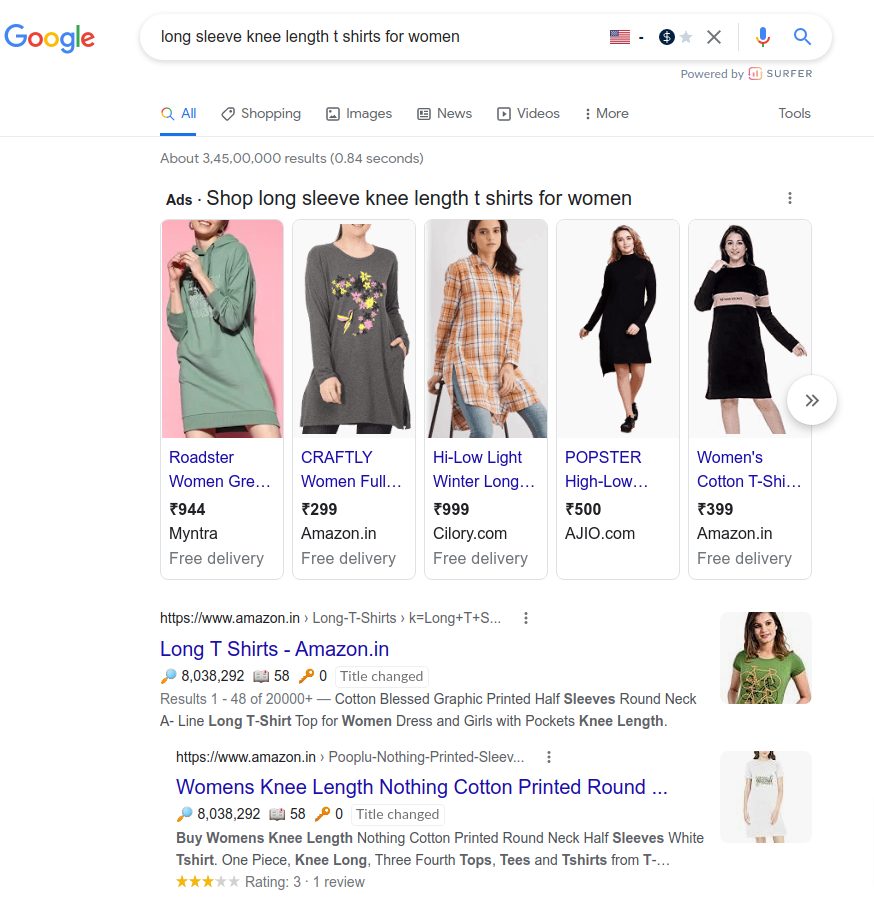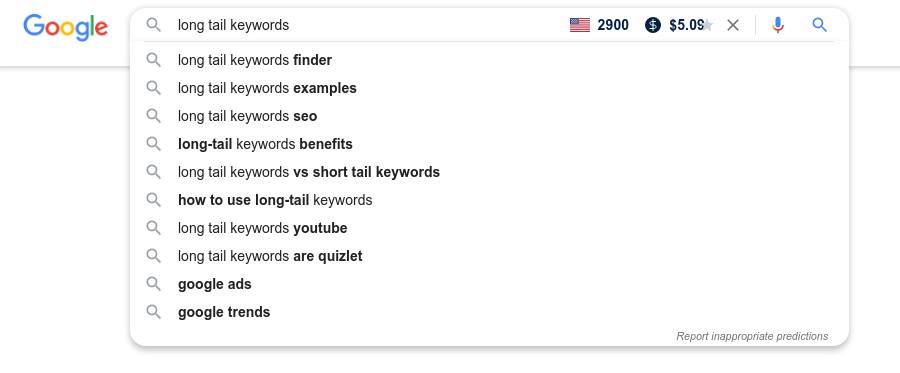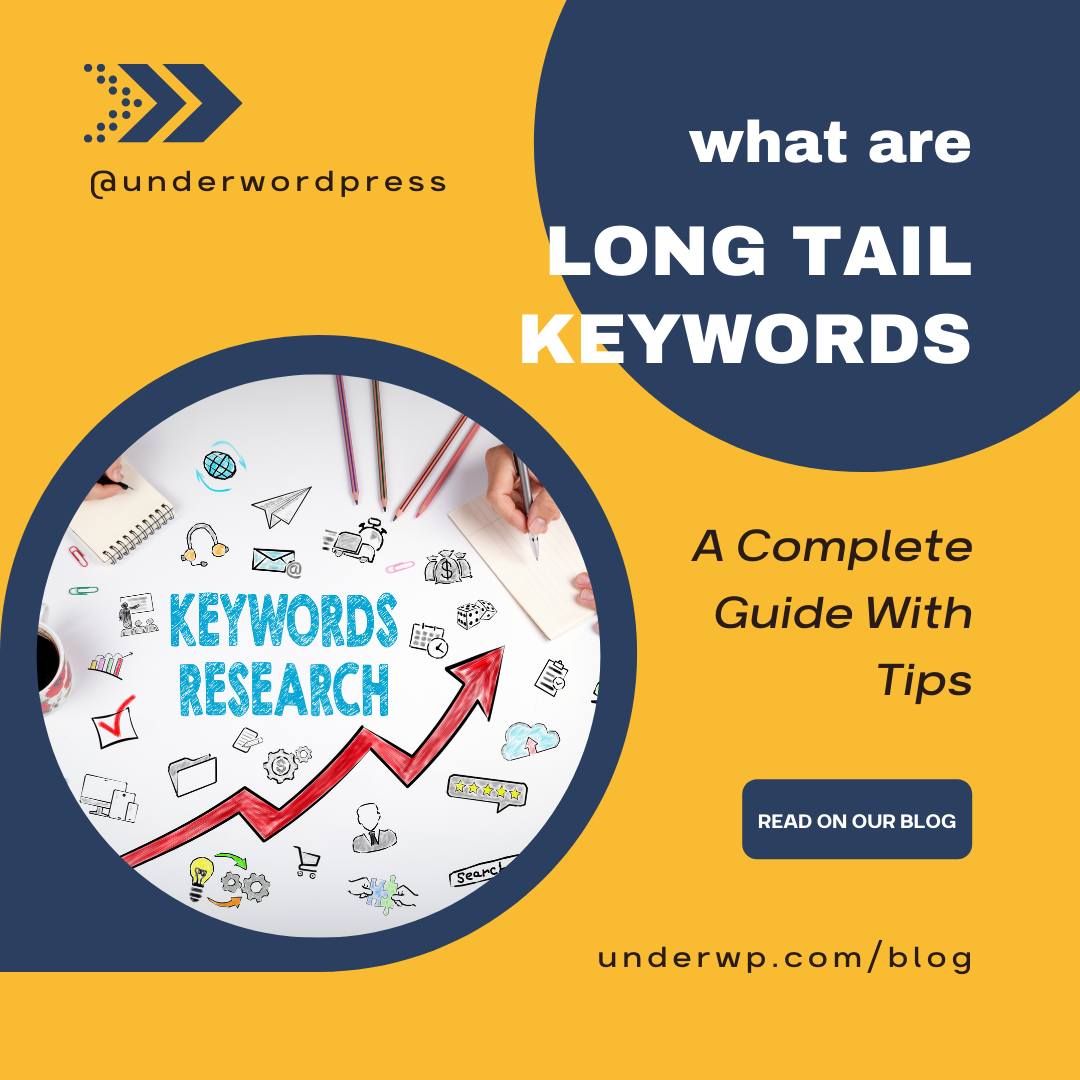Long-tail keywords help to rank easier with the right content strategy and they can be more valuable if you know how to use them. They tend to have higher conversion rates.
Now, I know what you're thinking: Long tail keywords and SEO – is that a match made in heaven? Let's find out. If done correctly, long-tail key phrases should help us shape up our content and strategy to get more traffic from search.
To give you an idea of what I am about to explain: Customers searching for “orange juice” are more likely to buy a specific brand rather than just general orange juice, which means they are 86% more likely to make a purchase than customers searching for “orange juice” ( i.e., broad keyword ).
What are longtail keywords?
There isn't an official description for it stating a long tail keyword should contain these many words., but generally it is considered as keywords with 3 or 4 words.
A long-tail keyword strategy comes in handy when there's a lot of competition in your market.
Our idea is to make conversations happen in the virtual world. Whether it's competitive or not is the next tactic.
A lot of competition runs for the main keywords. But for a specific search, it focuses on the particular niche where the content is clear.
Head keywords or short-tail keywords can be very competitive. Whereas long-tail keywords are highly focused on the particular customer and less competitive.
If your search query is specific, it means you are going to take an action out of that.
Long Tail Keywords Vs Short Tail Keywords
When it comes to search engines, there are two types of keywords. Long tail keywords and short tail keywords.
The long-tail keyword is one that has three or more words. It usually contains three or more words and often includes a modifier like a location or product category in it.
For example: “buy hoverboards near me,” “used cars for sale by owner,” “car hire Adelaide airport.”
The short-tail keyword is one with only two words in it and often occurs at the beginning of the sentence.
For example: “hoverboard,” “rental car,” “Adelaide.”
Both of these kinds are very helpful for any website's SEO. They will get you the results in the short and long term when used appropriately.
How good can be Long Tail Keywords?
Long-tail keywords are vital for any business because they make the most of searches.
If you consider google as a human having a heart, it keeps the experience of search and gives it in the way people want to enjoy. Why should it every time show the ones which were discarded earlier by readers?
Even though the 20 % overall search keywords on the top list are the head ones that are small and classy, we have an 80% search coming from long-tail search keywords.
We have a nice blog post that lists all Google search operators. There we have discussed some neat tricks to get untapped keywords. Most of them are long-tail keywords. Read this post here: https://underwp.com/a-complete-list-of-google-search-operators/
Many SEO professionals say that they do long tail SEO. What they mean to say is that they will be using long-tail keywords related to your website's main keyword and perform SEO activities on it.
Let's see the benefits of long tail keywords for your business.
- Less Competition
One of the biggest advantages of long tail keywords is they have less competition online. Not all websites in your niche will be targeting long tail keywords.
There can be many reasons for that. Maybe they don't have the expertise to write content for the long tail keywords. Or they still don't know about the long tail keywords.
Whatever may be the reason, you will always find keywords with less competition in any niche if you know where and how to look for them.
Long tail keywords can get your website on top of search engines easily and get you visitors that are related to your niche. Now it is your product and website that will help them convert into leads.
Having a good website is an important part of any business. Check out our professional WordPress website development services to have yourselves a website that can not just show your business but also get you leads that can be converted to sales.
A long-tail keyword is a more specific keyword phrase, which targets a more defined audience. When selecting keywords for your website, it's important to remember that less competition does not mean less traffic. It just means there aren't as many people searching for the same thing.
An example of long tail keywords can be seen in the Ecommerce category. Whenever you search for a keyword that is remotely related to the main keyword on Google, it shows you the pages from the big giants on its search results.

In the above image, you can see that when we search for the long tail keyword “long sleeves knee length women t shirts” on Google, it shows pages from Amazon.
If you look closer at it, the two pages are shown related to the keyword we searched. But the exact page which has our search term is not found on Amazon.
So Google shows related pages when it cannot find the exact search term pages on the internet. Also, an important point to be noted here which we will discuss later in this post.
Now if you can come up with a page that targets this long tail keyword with unique content and images, you can surely give competition to Amazon in India. A very important tip to be remembered.
- Targetted Visitors
Long tail keywords will bring you a targeted set of visitors to your website. These visitors are looking for more information than just generic information related to your business.
A long-tail keyword is a more specific keyword phrase, which targets a more defined audience. The search quantity of these keywords can be less but it most certainly brings you, quality visitors.
Let's say you have a site selling wooden chairs. You have just started it, and you also have a competitor site selling the same chairs.
Your site gets about 1,000 visitors per day, and your competitor's site gets about 500 visitors per day.
The term “wooden chair” is a short tail keyword that is more general. It has low competition, but it will not generate much traffic. The term “wooden antique chair” is a long-tail keyword that is more specific.
It will get you less traffic than the short tail keyword, but it will be of higher quality because it is more specific and has lower competition.
The long tail keywords are usually the ones that generate high-quality traffic for a website. These visitors are more likely to turn into buyers of your service or product.
- Establish Authority
When it comes to SEO and search engine optimization, the longer your content is, the better. Longer content has the potential to show up at the top of Google's search results more often than short posts do.
This is because long-form content provides Google with more information about what your post is about and gives them more to work with in terms of ranking factors such as keyword density, bounce rate, and time spent on-page.
This doesn't mean that you should write an 800-word essay for every blog post you publish. Instead, think about how you can expand on your given topic by adding supporting information and additional details.
Doing so will help you connect with your readers on a deeper level and will give Google more content to work with in terms of ranking your post higher in search results.
This is also called authoritativeness in the eyes of Google. Read our blog post here to learn more about EAT factor:
The Authority of a website is a vital SEO ranking factor for Google. It calculates the ranking position based on the authority of the website in its niche.
This authority is shown by sharing the niche knowledge on the website content. When you share more content related to your niche, it means you have more expertise in your business niche.
This in turn helps Google bots to rank your website for various keywords for the searches related to your niche.
In the above example when we searched for a long tail keyword “long sleeves knee length women t shirts” on Google, it showed the top results from Amazon. Even though Amazon didn't have any related page targeting directly to our long tail keyword.
Why did this happen? Why did Google show two pages from Amazon for our long tail keyword search? Why did it not select any other website?
The answer to all the above questions is Authority. The authority of a website decides its strength to rank for keywords in its niche.
Long-tail keywords help you gain authority in your niche. It can help you generate content that shows that you are the authority of your business. You know more than your competitors.
Finding long-tail keywords and generating content for them will get your website authority factor that is not possible with short-tail keywords.
How To Find Long Tail keywords?
Long-tail keywords often indicate a conversation turning into action. Long-tail keywords that are user-oriented can easily tap revenue.
Finding the right long-tail keyword is not easy as you do for the head ones.
First of all, understand your market and USP. Understand your target and decide what they want and need.
Create a list of questions and answers.
Step into the shoes of at least 10 customers' minds and think what they intend to think.
Get some ideas from the tools that generate keywords.
Finally, understand google also has a heart, it gives people matters that they want to enjoy too.
So dig deeper to get a suitable long-tail keyword and in the end, you will hit sales.
And then there are many online SEO tools that can help you find long tail keywords related to your niche.
- Using Google Autosuggest

The easiest, fastest and best tool is to use Google's autosuggest feature to gain long tail keywords. Also the more effective tool in my view.
In the above image, you can see the perfect example. Something I did myself when writing this blog post.
I searched for the main keyword and then press space. Google then shows me related searches and autosuggest terms that are searched by other users when searching for this keyword.
- Search in forums and Q&A Websites
This is a little bit more work than the above tool. You need to do more searches and spend time to find long tail keywords with this method. But when you do, it is so much worth it.
Search on Google with this cheat code to get results from Reddit, Quora, StackOverflow, etc.
site:reddit.com digital marketing
This example search will get you all the pages from Reddit that talk about digital marketing. Similarly, it can be used to search other forums and community websites.
If you search using the above example, try using long tail keywords you find from Google autosuggest as we discussed above. You will be surprised how many untapped long tail keywords can be found in the communities and forums.
Long tail keywords found with this method is not usually seen with paid tools like Semrush. So the keywords you find here are precious and help you gain search rankings faster. No other competitor of your website knows about this. Yet!
- Use Free Online Keyword Tools
The first method of Google autosuggest can get you the long tail keywords the fastest way. The second method will make your work more and spend time to get the golden long tail keywords.
Using free online SEO tools, you can get some good long tail keywords too. These tools will cut short your time for search and get you more variants of the head term/main keyword.
There are many free tools when you search google with this term: long tail keyword generator online
We also have a list of free SEO tools for keywords here:
My personal favourite are two free online tools, these are:
I like the Semrush keyword tool because it lets you enter up to 100 keywords and shows their competitive strength.
Long Tail Keywords SEO
Search engine optimization (SEO) is a method of increasing the visibility of a website or webpage in search engine results pages.
A popular way of doing this is by optimizing the content and keywords used on the webpage. This technique is called keyword optimization. And when you do this on long tail keywords it will be called long tail keyword optimization.
Trying to rank for long tail keywords can be a little tricky, but if done correctly, it can also bring in a lot of high-quality traffic to your website.
Did you know that 53% of all search engine queries contain 3 or more words? The average length of a query is more than 4 words.
If you can optimize your website for these long-tail keywords, you'll be able to dominate search engine results more easily and quickly than you could by targeting just the head terms!
- Unique Content
To generate content for long tail keywords you are required to have an in-depth knowledge of your business. It shows with the content that you write or produce.
Show the search engines and Google that you are good at what you do. This is shown by writing unique content.
One of the primary requirements for any good SEO strategy is good and unique content. If you can generate content for long tail keywords, then you are writing unique content.
- Content Strategy
When you are doing Long tail keyword SEO, you should always have a content strategy in place. How are you going to design the strategy that helps you rank better in search engines?
Putting the content in the right pages and categories is the first step of a good content strategy. Having breadcrumbs connecting to the main sales page from the long tail keyword content is also a good idea that can be implemented.
- Keyword Clustering
This is a concept that we will be writing more in detail in near future. To subscribe to our blog to get notified when we write about keyword clustering on our blog.
Keyword clustering is the concept of organizing or arranging your keywords based on their relatedness. More importantly, it's about determining which sets of related keywords you should use to target various pages on your site.
Targeting the head terms or main keyword page by linking it on long tail keywords content pages is a strategy we use on some of our websites. This way you are creating a set of pages that are closely related to the head term.
- Internal Linking
One of the major on-page SEO factors is internal linking. Internal linking is one of the most powerful and least understood SEO tactics you can use to improve your rankings and increase your website traffic.
When you create internal links, you give search engines a reason to crawl your site more frequently, which leads to higher rankings in search results.
Long tail keywords SEO can get you good rankings with proper internal linking structure. It also helps those who visit your web pages stay on the same webpage and that they find related content easily.
Final Words
When it comes to SEO, there are three things that you need to watch out for: the competition, the rankings, and the long tail keyword. Most SEOs know about the first two, but it is always a good idea to remind yourself of what your website is ranking for within Google's index – and how much volume is behind those keywords.
When deciding which keywords to use on your site or blog, you have to consider both long and short-tail keywords so that you get the best results possible.
As with most things in life, the longer you have at something the better you become at it and this is true with search engine optimization or SEO which stands for search engine optimization. Companies like UnderWP who have been doing SEO for some time can not only offer you a higher ranking than newer companies but they can also offer you specialized long tail keyword specific strategies to help you rank higher in search engines like Google, Yahoo & Bing.





Longtail keywords helped me gain traction on search engines when my website was new. Definitely recommended to go with long-tail keywords because they tend to rank easy.
Some longtail keywords will show zero or less number of searches on tools like Ahrefs. But in practice I found that these numbers are not always true.
One of the longtail keyword that showed 0 search volume in Ahrefs now brings me 200 visitors a day.
Using search operators and Google search console will get you a list of some amazing long tail keywords.
Always working with google helps rank you well with google!
Some nice tips in this post to find long tail keywords.
In my view, the long tail keywords are the best for startups. Doing SEO for these keywords is easy and gets you results faster.
I always target these keywords and SEO them to show to my clients some quick results. Also motivates me to work further into that niche.